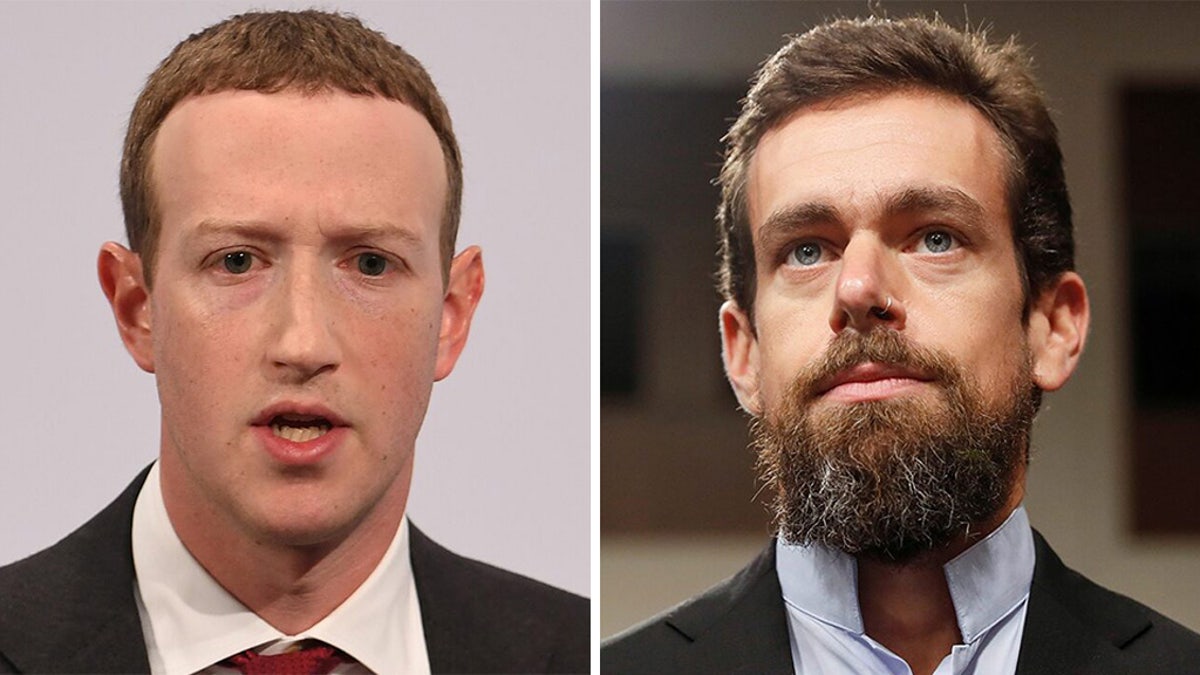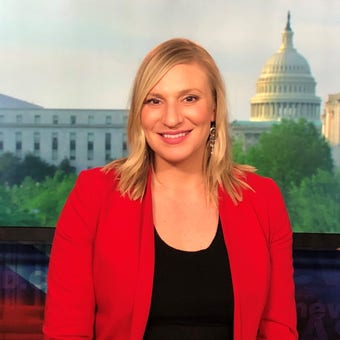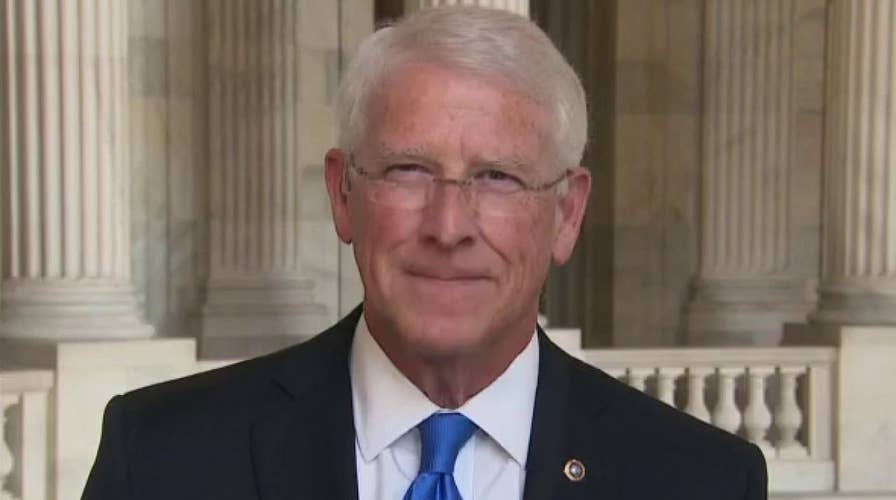Social media CEOs ‘liability shield’ under attack from Democrats and Republicans: Sen. Roger Wicker
Senator Roger Wicker, R-Miss., gives his take on Big Tech hearings, arguing there was ‘bias on behalf of the liberal point of view’ and ‘restriction to conservative thought.’
The CEOs of major tech companies will be in the hot seat Wednesday as Republican senators accuse their internet platforms of censoring conservative viewpoints and demand changes to the federal law that protects them from lawsuits.
Republicans have long been concerned that Big Tech was biased against conservative viewpoints, but Twitter's effort to shut down the spread of the New York Post's reporting on emails allegedly from Hunter Biden's laptop was the final straw, prompting lawmakers to summon Google, Facebook and Twitter CEOs to testify before the election.
At the heart of Wednesday's hearing before the Senate Commerce Committee is whether social media giants should still be afforded liability protections under Section 230 of the Communications Decency Act of 1996. Republican critics believe that Twitter, Facebook and Google should no longer be shielded as a neutral platform when they operate more like a publisher, but not all Democrats -- including the Section 230 co-author Sen. Ron Wyden, D-Ore., -- agree.
BIG TECH CEOS CALLED TO TESTIFY WEDNESDAY BEFORE SENATE AMID CENSORSHIP UPROAR
The chairman of the committee, Sen. Roger Wicker, R-Miss., has co-sponsored legislation to reform Section 230 to better define what tech companies can censor and to disincentivize them from editorializing posts with warning labels and fact-checks, which has happened in recent months to President Trump's tweets.
“Section 230 gave content providers protection from liability to remove and moderate content that they or their users consider to be ‘obscene, lewd, lascivious, filthy, excessively violent, harassing, or otherwise objectionable,'" Wicker is expected to say in his opening statement Wednesday provided to Fox News. "This liability shield has been pivotal in protecting online platforms from endless and potentially ruinous lawsuits. But it has also given these internet platforms the ability to control, stifle, and even censor content in whatever manner meets their respective ‘standards.’ The time has come for that free pass to end.”

Facebook CEO Mark Zuckerberg (left) and Twitter CEO Jack Dorsey with testify before a Senate committee this week. (Reuters)
The 10 a.m. EST hearing entitled: “Does Section 230's Sweeping Immunity Enable Big Tech Bad Behavior?" will feature Twitter CEO Jack Dorsey, Facebook CEO Mark Zuckerberg and Sundar Pichai, CEO of Alphabet and Google. The three tech titans will appear remotely.
Lawmakers want to know how the tech companies make content moderation decisions, how they decide to deploy fact-checkers and the legitimacy of those fact checks, how they are using Section 230 when they are determining what content to remove. There's also concern from lawmakers on consumers' data privacy, media consolidation, election interference and Big Tech's negative impact on local journalism.
Sen. Ted Cruz, R-Texas, said he'll be demanding answers on Big Tech's efforts to suppress free speech and interfere in the 2020 election by trying to shut down a story unflattering to Democratic presidential nominee Joe Biden.
“I have long said that Big Tech poses the single greatest threat to our First Amendment rights and the future of democracy," Cruz said.
Facebook's Zuckerberg is advocating for changes to Section 230 saying more clarity from the government is needed.
"Congress should update the law to make sure it's working as intended," Zuckerberg is to say in prepared remarks while calling for bipartisan solutions.
"At Facebook, we don’t think tech companies should be making so many decisions about these important issues alone," he continued in a statement reviewed by Fox News. "I believe we need a more active role for governments and regulators, which is why in March last year I called for regulation on harmful content, privacy, elections and data portability."
Alphabet's CEO expressed caution about changing the law, saying Section 230 has been "foundational" to U.S. leadership in the tech sector.
"I would urge the committee to be very thoughtful about any changes to Section 230 and to be very aware of the consequences those changes might have on businesses and consumers," Pichai says in an opening statement obtained by Fox News.
Twitter's Dorsey defended Section 230 and warned repealing the protections could backfire by having more content removed.
TWITTER'S JACK DORSEY TO WARN 'ERODING' SECTION 230 COULD 'COLLAPSE' INTERNET COMMUNICATION
“Eroding the foundation of Section 230 could collapse how we communicate on the Internet, leaving only a small number of giant and well-funded technology companies,” Dorsey said in written testimony obtained by Reuters ahead of the hearing. “We should also be mindful that undermining Section 230 will result in far more removal of online speech and impose severe limitations on our collective ability to address harmful content and protect people online.”
Section 230 shields companies from liability for user-generated content while allowing them to remove posts that are defined as "obscene, lewd, lascivious, filthy, excessively violent, harassing, or otherwise objectionable." Wicker's legislation, known as the Online Freedom and Viewpoint Diversity Act, takes aim at the "otherwise objectionable" language, arguing that Big Tech has used those words to take down posts executives just don't like.
Wicker's legislation would replace that term with more concrete terms, including “promoting terrorism,” “unlawful,” and content that promotes “self-harm." It would also clarify that the definition of “information content provider” includes instances in which a person or tech entity modifies or editorializes a user's post. So if Twitter, for instance, puts a warning label on a tweet about it being misleading or glorifying violence, the company would become a publisher of that post and no longer eligible for the liability shield.
Democrats have their own issues with Big Tech, including allowing foreign election interference in the 2016 election, stifling local journalism and the threat of growing monopolies that need to be broken up.
Wyden, who co-authored Section 230 with former Rep. Christopher Cox, R-Calif., said Section 230 has become a scapegoat for the anger that people have against Big Tech. But he defended the premise of the law and said he supports other legislation that would tackle the tech abuses, such as dusting off anti-trust laws, data privacy and addressing computer algorithms that produce bias.
"I think Section 230 often is just seen as a kind of multi-purpose kind of opportunity to say you're angry about what goes on online," Wyden told actors Chris Evans and Mark Kassen in a conversation for "A Starting Point" posted Tuesdsay. "Well, I'm angry too -- about misinformation and slime, and all of the horrendous stuff that goes on out there."
Wyden told progressives to be leery of advocating for repealing Section 230 altogether, saying that the law has given rise to movements like #metoo and Black Lives Matter that would have been ignored by the mainstream media.
"The biggest advocate of getting rid of 230 is Donald Trump," Wyden said. "And the reason he wants to get rid of 230 is because he thinks he ought to be able to bully Twitter into printing his lies on issues like vote by mail."
Tech companies previously told Congress their platforms are not biased against conservative voices and they are expected to emphasize their impartiality again Wednesday.
"We approach our work without political bias, full stop," Pichai said in prepared remarks.
But Republicans do have the perception they are being targeted and plenty of high-profile anecdotal examples to back them up. The Senate Commerce Committee prepared a 17-page report on "social media companies censoring prominent conservative voices" that goes far beyond the latest Hunter Biden email controversy and chronicles YouTube, Twitter and Facebook restrictions on pro-life, GOP and conservative posts dating back to 2016.
A Pew Research Center survey out in August found that 90 percent of Republicans say it is likely social media companies censor political viewpoints, compared to 59 percent of Democrats.
That being said, the top-performing links on Facebook routinely come from the right. On Oct. 26, the best performing links came from President Trump, Fox News, Franklin Graham and Don Bongino, according to Facebook's Top 10 monitoring.
Rep. Ro Khanna, D-Calif., said if social media companies lose Section 230 protections the companies would crackdown on content even more because they would now be exposed to lawsuits for defamation or libel, like a newspaper. Khanna, who represents Silicon Valley, said he disagrees with how Twitter handled the New York Post story, but said repealing Section 230 would make censorship of speech even worse.
"Those platforms basically will turn into places where you put pictures of your pets and maybe your kids, but almost nothing political," Khanna told Fox News.
Fox News' Kelly Phares contributed to this report.
















































